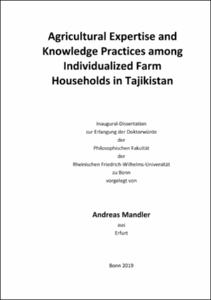Mandler, Andreas: Agricultural Expertise and Knowledge Practices among Individualized Farm Households in Tajikistan. - Bonn, 2019. - Dissertation, Rheinische Friedrich-Wilhelms-Universität Bonn.
Online-Ausgabe in bonndoc: https://nbn-resolving.org/urn:nbn:de:hbz:5-53610
Online-Ausgabe in bonndoc: https://nbn-resolving.org/urn:nbn:de:hbz:5-53610
@phdthesis{handle:20.500.11811/8134,
urn: https://nbn-resolving.org/urn:nbn:de:hbz:5-53610,
author = {{Andreas Mandler}},
title = {Agricultural Expertise and Knowledge Practices among Individualized Farm Households in Tajikistan},
school = {Rheinische Friedrich-Wilhelms-Universität Bonn},
year = 2019,
month = jun,
note = {In the context of the post-Soviet restructuration of the agricultural sector and rural livelihoods throughout Central Asia, the present thesis addresses farmers approach to knowledge in marginal mountainous areas in northern Tajikistan. Against the background of the individualization of agricultural production also in remote rural areas such as the Zarafshan Valley, the study scrutinizes how farmers' approach knowledge to maintain their livelihoods. The primary subjects of the study are thus individualized agricultural expertise and knowledge practices in everyday rural livelihood provision.
Departing from the perspective on knowledge and expertise in everyday agricultural praxis, the research integrates governance processes, which are conceptually considered being co-produced together with knowledge. Due to its volatile and uncertain outcomes, governance processes in rural Tajikistan are conceptualized as meshwork arrangements. Under the conditions of the neopatrimonial authoritarian state, the individualisation of Tajik agriculture unfolded as limited access order (LAO). LAO are political arrangements where the ruler or aligned elites limit the access to opportunities and resources for other political or economic actors. The study argues that such political economy allowed only for a protracted agro-economic performance of the individualized farm households. Despite completely individualized production processes, only a minority of farm households in the Zerafshan Valley are actually market-oriented producers.
Against this finding, the present research notes current Zarafshani farmers disregard for agricultural expertise, while determining noticeable attention to knowledge practices that potentially manoeuvre governance arrangements. Under the conditions of uncertain meshwork governance arrangements and LAO, the individualization of agriculture did not create conditions that incentivize farmers to invest in agricultural expertise. The research outlines that there is no deficit of agricultural expertise, but a lack of request. Instead, under the conditions of individualized agricultural production, local farm households are constraint to engage in governance processes in order to maintain their livelihoods.},
url = {https://hdl.handle.net/20.500.11811/8134}
}
urn: https://nbn-resolving.org/urn:nbn:de:hbz:5-53610,
author = {{Andreas Mandler}},
title = {Agricultural Expertise and Knowledge Practices among Individualized Farm Households in Tajikistan},
school = {Rheinische Friedrich-Wilhelms-Universität Bonn},
year = 2019,
month = jun,
note = {In the context of the post-Soviet restructuration of the agricultural sector and rural livelihoods throughout Central Asia, the present thesis addresses farmers approach to knowledge in marginal mountainous areas in northern Tajikistan. Against the background of the individualization of agricultural production also in remote rural areas such as the Zarafshan Valley, the study scrutinizes how farmers' approach knowledge to maintain their livelihoods. The primary subjects of the study are thus individualized agricultural expertise and knowledge practices in everyday rural livelihood provision.
Departing from the perspective on knowledge and expertise in everyday agricultural praxis, the research integrates governance processes, which are conceptually considered being co-produced together with knowledge. Due to its volatile and uncertain outcomes, governance processes in rural Tajikistan are conceptualized as meshwork arrangements. Under the conditions of the neopatrimonial authoritarian state, the individualisation of Tajik agriculture unfolded as limited access order (LAO). LAO are political arrangements where the ruler or aligned elites limit the access to opportunities and resources for other political or economic actors. The study argues that such political economy allowed only for a protracted agro-economic performance of the individualized farm households. Despite completely individualized production processes, only a minority of farm households in the Zerafshan Valley are actually market-oriented producers.
Against this finding, the present research notes current Zarafshani farmers disregard for agricultural expertise, while determining noticeable attention to knowledge practices that potentially manoeuvre governance arrangements. Under the conditions of uncertain meshwork governance arrangements and LAO, the individualization of agriculture did not create conditions that incentivize farmers to invest in agricultural expertise. The research outlines that there is no deficit of agricultural expertise, but a lack of request. Instead, under the conditions of individualized agricultural production, local farm households are constraint to engage in governance processes in order to maintain their livelihoods.},
url = {https://hdl.handle.net/20.500.11811/8134}
}






